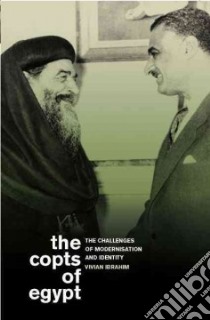The Copts of Egypt - 9781848854994
Un libro in lingua di Vivian Ibrahim edito da Tauris Academic Studies, 2011
- € 107.70
- Il prezzo è variabile in funzione del cambio della valuta d’origine
The Copts of Egypt, who make up 10-15 per cent of the population, have traditionally been viewed as a 'beleaguered and persecuted minority'. Using newly discovered Coptic archival sources, Vivian Ibrahim presents a fresh and vivid alternative reading of the community during the twentieth century. Avoiding the established portrayal of a monolithic entity headed by the Coptic Pope, Ibrahim examines the multifaceted dimensions of the Coptic community, assessing Coptic-State relations on one hand and Coptic intracommunal dimensions on the other.
Examining the impact of the British Occupation of Egypt on the making of new national identities, she explores the emergence of a new politically active Coptic class; highlighting popular Coptic grassroots mobilisation during the 1919 revolution through the case-study of the Coptic priest Qommus Sergius. She discusses the centrality of the Copt and Wafdist, Makram Obeid, on constitutional politics, and his role as a whistleblower during the 'Black Book Affair'. Breaking with the portrayal of a defenceless community, Ibrahim also reveals a strong Coptic response to the emergence and threats of Political Islam through the press. She presents and analyses for the first time, the unique satirical 'Ode to the Fezzed Shaykh', aimed at Muslim Brotherhood leader Hassan al-Banna.
In The Copts of Egypt, Ibrahim also reveals fierce factionalism within the Coptic community in its struggle for modernisation. Examining mass corruption in monasteries and in the run-up to papal election campaigns, she analyses the ways in which the Church used the Egyptian State to bolster its claim to political as well as religious representation over the community. Through the establishment of benevolent and philanthropic societies, Ibrahim argues that Coptic youths were amongst the first to negotiate a role for themselves in post-revolutionary Egypt. Adopting President Nasser's revolutionary rhetoric of Tathir, or cleansing, Ibrahim examines how a group of Coptic youths abducted their Pope and forced through their own agenda of religious and political reform. This book will be essential reading for scholars of the Coptic community and Middle East Studies.
Informazioni bibliografiche
- Titolo del Libro in lingua: The Copts of Egypt
- Sottotitolo: The Challenges of Modernisation and Identity
- Lingua: English
- Autore: Vivian Ibrahim
- Editore: Tauris Academic Studies
- Collana: Tauris Academic Studies (Hardcover)
- Data di Pubblicazione: 15 Gennaio '11
- Genere: HISTORY
- Pagine: 258
- ISBN-10: 1848854994
- EAN-13: 9781848854994


